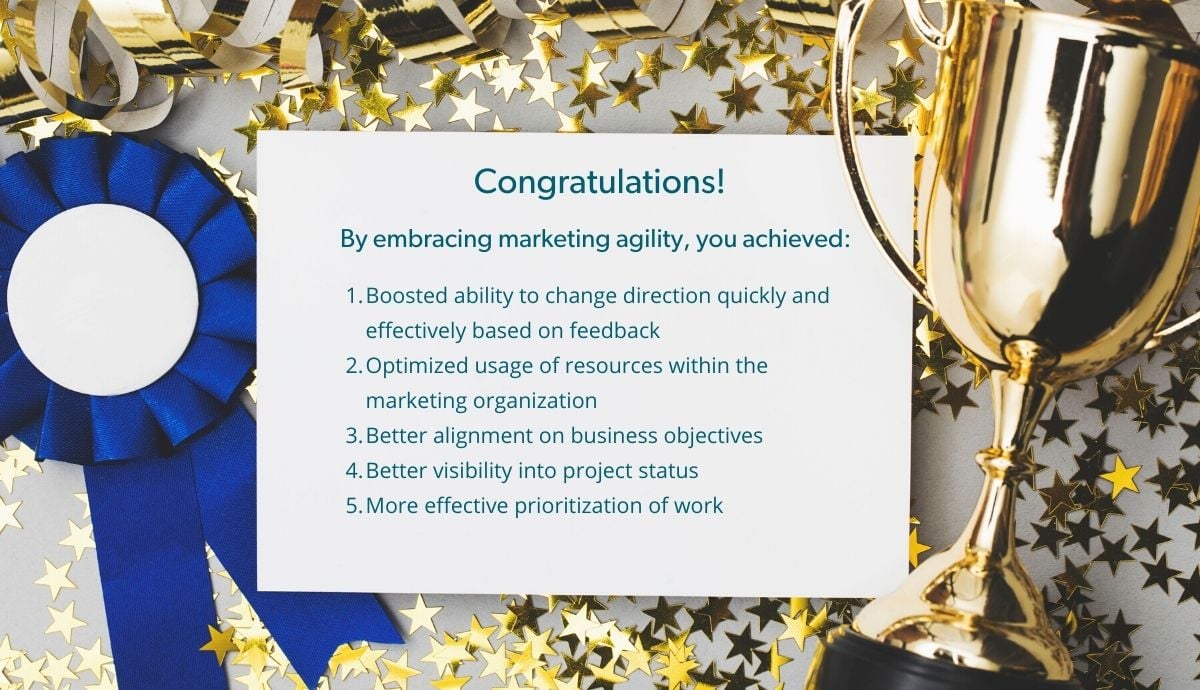This post has been updated with new data from the most recent reports from Salesforce and AgileSherpas.
Time for the obvious statement of the day: marketing is a challenging field to work in. It also evolves by leaps and bounds every year and even seasoned professionals struggle to keep up.
Although the goal of marketing doesn’t change (helping businesses and customers to find each other), the means we use to achieve it do. When we add the chaotic nature of the marketing process and the great number of dependencies between marketing and other organizational functions to the mix, we see why working in marketing can be so demanding.
For seven years in a row, Salesforce has been looking into the state of marketing and how the function has been evolving. The data they’ve been collecting and documenting in their State of Marketing Report gives insight into the top priorities and challenges of professionals across the organizational hierarchy.
The 2021 edition of the report was based on a survey of over 8,000 marketers and showcased the five greatest challenges that marketers face at the moment:
- Engaging with customers in real-time
- Innovating
- Creating a cohesive customer journey across channels and devices
- Collaboration
- Insufficient organizational structures and processes
And now for a statement that may not be quite so obvious: Agile marketing can solve these problems. What makes us so certain? In short, the Agile data that we’ve been collecting ourselves. Let’s dive right into it.
The State of Agile Marketing

Like Salesforce, we have been keeping a close eye on how marketing has been changing over the past few years. However, our focus has been quite a bit narrower. The data that we’ve been collecting gravitates around the reasons why marketers turn to Agile and how it is solving the challenges they experience.
Since 2018, we have been surveying thousands of marketing professionals and compiling the Agile data we’ve gathered into annual reports. Almost every year, we’ve witnessed a steady growth in adoption:
- 2018 - 37% of all respondents considered themselves Agile
- 2019 - 32% of all respondents considered themselves Agile
- 2020 - 42% of all respondents considered themselves Agile
- 2021 - 51% of all respondents considered themselves Agile
There are quite a few reasons for the rapid adoption increase during the past couple of years. Since it is 2021, let’s have a look at the Agile data recorded this year:
- 65% of all Agile marketers wanted to enhance their ability to manage changing priorities
- 58% of all Agile marketers aimed to improve productivity
- 56% of all Agile marketers strived to accelerate the delivery campaigns, programs, or tactics
- 44% of all Agile marketers wanted to improve the quality of their deliverables
- 44% of all Agile marketers needed to improve alignment with other teams or business objectives
Interestingly enough, these motives directly correlate with the marketing challenges documented by Salesforce.
Benefits of Embracing Marketing Agility

Ok, now we know the motives that drive marketers toward seeking agility. But what are the actual benefits that they experience from going Agile? The Agile data we collected reveals that:
- 76% of the participating Agile marketer are now more effective at prioritizing their work
- 73% achieved higher productivity
- 71% improved the quality of their work
- 64% boosted team morale as a benefit of marketing agility
These benefits aren’t speculation; they’re supported by the answers of 350+ marketers, collected in preparation for the 7th Annual State of Agile Marketing Report in 2024. Of all surveyed marketing professionals:
- 61% said that their organizations plan to transition some marketing teams to Agile
- 25% confirmed that they intend to transition all of their marketing teams
Only 14% didn't plan to transition any teams to Agile ways of working..
Connecting the Dots
Looking at the marketing challenges documented by Salesforce and the benefits that marketers experience as a result of adopting Agile, it's clear that there's a connection between them.
Therefore, we can easily map each benefit to a specific challenge that troubles professionals all around the world. Let’s look at the following table and connect the dots.
|
Marketing Challenge |
Agile Benefit |
|
Engaging with customers in real-time |
Boosted ability to change direction quickly and effectively based on feedback |
|
Innovating |
Optimized usage of resources within the marketing organization |
|
Creating a cohesive customer journey across channels and devices |
Better alignment on business objectives |
|
Collaboration |
Better visibility into project status |
|
Insufficient organizational structures and processes |
More effective prioritization of work |
What’s the Holdup?

If Agile can solve all of these problems and provide such substantial benefits to individual marketers AND their organizations, what gives? Why aren’t we all demanding to go Agile right this very minute?
Trying to understand the barriers that prevent marketing organizations from fully implementing an Agile approach, we collected the following data:
- 51% lack training and knowledge about Agile approaches
- 42% lack support from management or executives
- 33% believe their current process is working well enough
- 33% don't have time to try something new
- 33% lack the right talent to transform the team to Agile
- 27% don't have the right tools to support an Agile approach
The path to agility isn’t a walk in the park, but the data we’ve collected confirms that many have taken or plan to take steps forward in their Agile journey and the factors playing a major role in this decision:
- 64% said that the competitive business landscape has made marketing agility more important
- 55% said that the current economic climate has made marketing agility more important
- 52% said that changes in their marketing budget have made marketing agility more important
Up to the Challenge?
Let’s be honest, the marketing wheel won’t stop spinning, and by the looks of it, won’t slow down either. Whether we manage to keep up with the pace of change largely depends on the organizational choices that we make.
Thankfully, there is so much data available at our fingertips. With its help and the intrinsic motivation to be successful as individuals and organizations, we can thrive and continue to grow despite all the challenges in front of us.
So let’s put Agile processes in place to give us the work environment we deserve.
Because we’re not going anywhere, and neither are these challenges.




